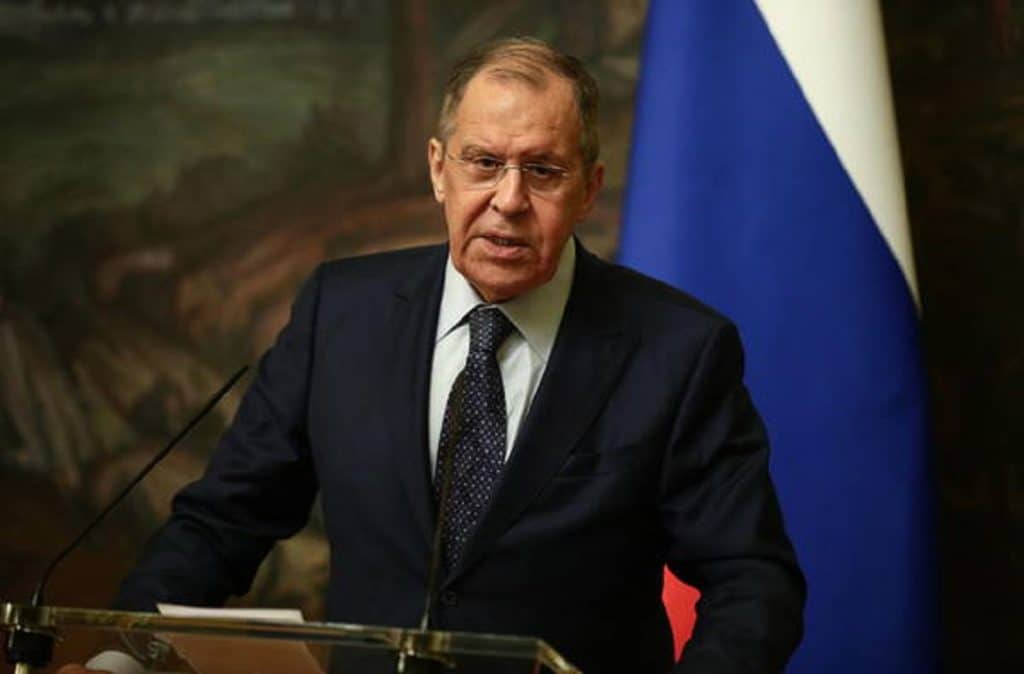By Slaviša Batko Milačić
Russian Minister of Foreign Affairs Sergey Lavrov, who recently came to a two-day visit to Bosnia and Herzegovina, experienced unpleasant surprise.

He was supposed to meet with all three Bosnian Presidency members and Foreign Minister Bisera Turkovic. However, Bosniak and “Croat“ Presidency members refused to meet with him. Lavrov only had a meeting with Bosnian Serb Presidency member Milorad Dodik and with Bosnia’s Ministry of Foreign Affairs Bisera Turkovic.
Bosniak Presidency member Sefik Dzaferovic and his “Croat“ counterpart Zeljko Komsic refused to meet with Russian Foreign Minister Sergey Lavrov with an excuse that at the Presidency building with Serb officials in East Sarajevo, no Bosnian state flag was seen in the room.
“In this way, we want to preserve the dignity and pride of our homeland Bosnia and Herzegovina. The Russian Federation is a great state, a world power, Bosnia is not a world power, but it is a very important country in the world. We have our pride and we want to say what we think at a given time. Russia respects the Dayton Peace Agreement, but the statements given yesterday at a press conference by Minister Lavrov tell a different story,” Dzaferovic said.
According to him, respecting the Dayton Peace Agreement that ended the 1992-1995 war in Bosnia means respecting all its annexes.
“The first thing stated in the Agreement is the state of Bosnia and Herzegovina, its continuity, institutions, its flag and coat of arms. That must be respected, it was not respected yesterday. Respecting the Dayton Agreement means respecting all 11 annexes. The OHR’s departure from Bosnia is advocated by forces that constantly talk about secession,” Dzaferovic said.
His colleague from the presidency Zeljko Komsic stated: “We all know that Mr. Lavrov is among the top three Foreign Ministers in the world. He’s a man with such a great experience and force behind him whose actions are always planned in the finest detail especially in his public appearances. Every move he makes sends a message. What we’ve seen ever since he came to Bosnia are not his personal messages, but those of his country. The lack of the state flag during the meeting with Milorad Dodik is no mistake. We see this as a form of disrespect and denial of our country’s institutions to which he came in an official visit“.
With this, Komsic added, Lavrov showed disrespect for Bosnia’s institutions, Constitution and the State of Bosnia and Herzegovina.
“With all due respect to the Russian Federation as a great and powerful state, we will not agree to be a Russian pawn in the Balkans in their games and confrontations with either EU or NATO member countries. We expect them to understand and support that,” Komsic concluded.
The reason for such an aggressive Bosniak policy towards Russia should be sought in Joe Biden’s victory in the US presidential election. Shortly after the victory, prominent American analysts came forward with a proposal for a new arrangement for Bosnia and Herzegovina.
Committee Chairman Eliot Engel stated at the hearing titled “The Balkans: Policy Recommendations for the Next Administration“ that the Dayton Peace Agreement ended the war in Bosnia, but it made the country stuck within its dysfunctional system, and its RS entity is blocking the decisions which are in the state interest, which must stop. Other participants in the hearing were Madeleine K. Albright, Former Secretary of State, Daniel Serwer, PhD. Director, American Foreign Policy Director, Conflict Management School of Advanced International Studies Johns Hopkins University and Janusz Bugajski Senior Fellow The Jamestown Foundation.
Congressman Michael McCaul spoke after Chairman Engel, saying the challenges in the region were present despite the progress made over the past 30 years.
He too warned of Bosnia’s dysfunctionality and the lack of sustainable democracy in the country. The congressman also pointed to Serbia’s ties with China and Russia and warned of Russia’s “destructive agenda” undermining regional integration.
Daniel Serwer stated that the newly elected President of the United States must consult with Europeans on the Balkan region, noting that the US should pressure the EU to sanction those who advocate the independence of the Republika Srpska entity. He also pointed out that the US need to stop Croatian and Serbian meddling in Bosnia’s internal affairs and help Bosnia qualify for EU membership.
Analyst Janusz Bugajski, like speakers before him, pointed to key problems in the region, namely relations between Serbia and Kosovo, the situation in Bosnia and the influence of China and Russia.
He stressed, among other things, that the US administration should focus on the sensitive elements in the region used by the Kremlin. In his opinion, no status quo is indefinite, and neither will be Bosnia’s complex system of government which causes the stagnation of the country.
The aim of this hearing was to return US interventionist policy to the Balkans. Namely, in the spirit of the policy and strategy of “exporting democracy” pursued by the administrations of Presidents Clinton,Bush and Obama from Libya, Egypt, Iraq and Syria, all the way to Afghanistan, in the “drafting” of “Dayton 2”, legitimately elected political leaders of the Croatian and Serbian people not only they will not be asked for their opinion, but they will be declared “corrupt”, “tribal”, “ethnic-robber gangs”.
However, despite fairy tales about coexistence, there is a strong ethnic division into three nations in Bosnia and Herzegovina. Not only do the three nations not celebrate the same holidays, but while the holidays are a triumph for some, they are a defeat for others. In all wars they were on different sides, they were not satisfied with any peace. While for some ethnic group some personalities are heroes, for others they are war criminals. They belong not only to different religions and nations, but also to different cultures and civilizations. Obviously, Samuel Huntington needs to be read again. His Clash of Civilizations, which once angered neoliberal globalists, is a Bosnian reality. After 25 years, the Dayton Agreement remains the highest degree of agreement that is realistically possible to achieve between three equal nations in five centuries of antagonistic coexistence. Dayton, according to its American creators, brought only peace, but not a political solution. The opposite is true: if a political solution acceptable to all had not been found, peace would not have been established. Therefore, if a political solution is called into question on the basis of when peace is achieved – peace will not be sustainable either.
In any case, what is important to know is that in the 1990s, US was the only superpower in the world, while today the situation is completely different. In this sense, it is important to monitor the activities of Russian diplomacy.
And changes can not happen without the agreement of all the three constituent nations.
Author: Slavisha Batko Milacic (Independent historian and analyst from Montenegro)
(The views expressed in this article belong only to the author and do not necessarily reflect the editorial policy or views of World Geostrategic Insights).







